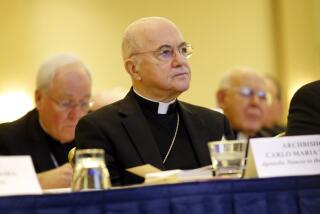Priest’s Faith Transcends the Scandals of Imperfect Church
Whatever your take on the Catholic Church scandal, I think we can all agree on one thing: The priesthood does not look like a particularly attractive career choice at the moment.
Even for the most virtuous padres who’ve ever worn the robes, it must be difficult to avoid guilt by association, given the sad parade of child molesters and cover-up artists.
That’s why I was intrigued when a monk I’ve known for several months told me he was leaving the solitude of his monastery near Palmdale and plunging into the fire of parish ministry.
What could possibly possess someone to do this, I wondered, at perhaps the worst moment in church history?
As bishops met in Dallas on Thursday to apologize to victims of sexual abuse, I hooked up with Father Paul Pluth at a Pasadena coffee shop. Pluth and I had e-mailed and chatted by phone, but we’d never met. He had been both a critic and defender of the church, and of my columns, too.
What I didn’t know was that Pluth, 48, came to Catholicism relatively late in life. In fact, he was raised a Lutheran and was a Lutheran minister in Long Beach for several years.
“I had a great congregation, I had a great house, I had two dogs, I had a Saab turbo I loved driving, and I felt lost and so depressed,” says the red-haired, blue-eyed Pluth, who grew up in Woodland Hills.
Toward the end of his time as a Lutheran minister, Pluth kept a secret. Early each morning, he would sneak off to a Catholic church that was far enough away so he wouldn’t be seen by a member of his own flock.
The diversity and fervor of parishioners attending morning Mass made him envious, but that wasn’t the only appeal. Pluth felt a stronger connection to a higher being than he ever felt in the Lutheran Church.
(With regard to that last paragraph, I’ll be curious to see whether Lutherans can match the letter-writing fury of Catholics, but I’m not expecting quite the same passion.)
“The Catholic Church has a very real sense of transcendence, otherness, and a mystical concept of God,” Pluth says. “There was a palpable sense that people were experiencing something meaningful and from beyond.”
Pluth decided to stop sneaking around. He quit the Lutheran ministry, converted to Catholicism in 1987, joined the St. Andrew’s Abbey monastery in 1988, and was ordained a priest in 1996. Not even the scandalous headlines of the last several months have made him regret the move for a minute.
“I can’t even comprehend” how priests could abuse children, or how bishops and cardinals could transfer them into parishes where they would prey on more children, Pluth says. But the church is first and foremost a “vessel in a quest for deeper meaning,” he says, and none of the current problems should get in the way of that purpose.
“My faith is not in the institution, it’s in Jesus Christ,” he says, and he believes most Catholics are with him on that, however horrified they are by the scandal.
Every institution, and every denomination, is imperfect, Pluth says. But the good thing about the current storm is that the church has been forced into the kind of self-examination that will make it more honest and responsible.
Still, when the stories hit the news, he was reluctant to wear the cleric’s collar on his trips into L.A. diocesan headquarters, where he worked on a marriage tribunal, having been trained in canon law.
But the reaction of strangers on the street lifted him. He was treated with civility and respect, and Catholics didn’t seem to have lost their heads over the scandal. He recalls one incident in particular.
“I was asked for a blessing by someone on the subway, and it almost brought tears to my eyes.”
That experience helped Pluth decide he wanted to be closer to the heart of the church--its people. So he’s taken a job in Seattle, beginning July 1, in which he’ll do canon law half the time and serve a parish the other half. Because of a shortage of priests, that parish is now run by a nun.
Pluth said he hopes the born-again convention in Dallas produces a zero-tolerance policy on sex abuse. But the more important reform, he says, is for clergy to bring lay people in as partners in the running of the church.
I’m not sure that newspaper columnists are going to be invited to that party. My Catholic guilt forced me to confess that some of my readers think I’m headed for trouble in the hereafter for taking the church to task. As one of them wrote:
“May God Have Mercy on Your Soul!”
I was curious to see whether Pluth thought I’d condemned myself to eternal damnation.
“That’s ridiculous,” he said. “God has a sense of humor.” Besides, he added, “You’re just holding the church up to the scrutiny called for by its own claims.”
Our loss. Seattle’s gain.
*
Steve Lopez writes Sunday, Wednesday and Friday. Reach him at [email protected].



